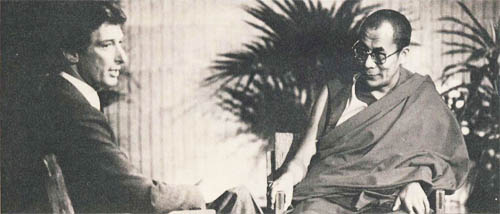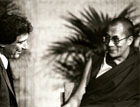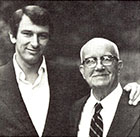
A Visit With His Holiness The Dalai Lama |
On October 19, 1979, the eve of his departure back to India following a historic 49-day visit to the United States, His Holiness the Fourteenth Dalai Lama met in conversation with Werner Erhard at the First and Second Church in Boston. This evening presentation of The Werner Erhard Foundation before an audience of about 300 guests was an outgrowth of Werner's initial meeting with the Dalai Lama, the acknowledged "Pontiff of Buddhism," three years earlier. They first met in Dharmsala, India, the residence of His Holiness since 1959, when the Chinese occupied his Tibetan homeland.
The tone of the evening was established in the simplicity of Werner's introduction: "I want to introduce you to a friend of yours—His Holiness the Dalai Lama." The Dalai Lama made an opening statement stressing the central importance of compassion in Buddhist thought and practice, noting that the message was simple, "but not so easy to practice." As he put down his papers at the end of what he called his "usual talk," he appeared to take in the audience individually and said, "People can be trained. People can train themselves to act with human compassion combined with wisdom." In the conversation which followed, the Dalai Lama expressed the magnanimity and wit of a man completely at ease with the responsibilities of his station, along with the humility and detachment one might expect of a simple monk. He used his hands and body freely to express himself. His expression shifted often between the furrowed brow of concentrated thought as he framed an answer to a question, and a lively, bemused smile as he assayed the effect of his words on Werner Erhard and the audience. He obviously enjoyed the opportunity to converse with Werner in English, and occasionally conferred with his interpreter in Tibetan on the translation of complex points of Buddhist philosophy. In none of the world's religious traditions are enlightenment and service to others more inseparable than in Tibetan Buddhist philosophy. Many of Werner Erhard's questions explored the relationship between internal development, personal enlightenment, and social responsibility: Werner Erhard: In certain stages of enlightenment, one begins to see the truth, and one begins to realize the lack of separation between self and others. But in the world, there often seems to be very little support for that universal sense. What would you say to those who go out into the world and see an apparent conflict between the experience of enlightenment and the feeling of attachment? Dalai Lama: With regard to happiness, it is suitable to give up small happinesses for great ones. With regard to suffering, it is suitable to take on small sufferings to get rid of great ones. If a person is taken advantage of, then without disturbing his compassion, he may make a strong surface reaction. Without wisdom, this is a contradiction. With wisdom, it is not a contradiction. Werner Erhard: In our culture, people typically like to measure things. Sometimes, after experiencing enlightenment, they look for proof—like a badge, or a medal—and in the absence of such proof may begin to doubt themselves.... Can you say something to the people in our culture about either the signs of enlightenment or the need for proof? Dalai Lama: Whether one's mind is tamed or not, one can discover by looking at one's behavior. There are two kinds of witnesses: others, and yourself. In this case, regarding your inner development, your own witness is most important. In closing the conversation, Werner Erhard thanked his Holiness for the blessing of being with him, "a benefit not only for myself but for the people with whom I interact. I want to express to you our appreciation of the work you do and of who you are in the world, and a sense of our own compassion for your work and for your courage and commitment, and for the quality of human being you are in the world. I admire the way you are a 'holy man.' It is a beautiful example for all of us about being human and being in the world." From The Graduate Review, February, 1980 |
|
In 1988 Werner Erhard was presented the Mahatma Gandhi Humanitarian Award: “In honor of your notable effort to end the starvation and hunger suffered by millions throughout the world and for drawing broad public awareness to the value of integrity in our everyday lives.”
|
||




